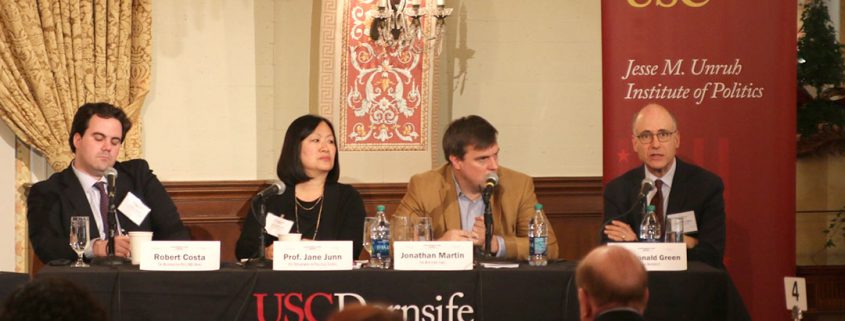Dornsife hosts presidential election conference
Dornsife College of Letters, Arts and Sciences hosted the “2016 Presidential Election Conference” on Tuesday, bringing notable strategists, political consultants, journalists and professors to campus to sum up and debate the outcomes of the 2016 presidential election.
The last panel of the conference featured Joel Benenson, a pollster for Obama in 2008 and 2012 and Hillary Clinton’s chief campaign strategist in the 2016 race; Alex Castellanos, a political consultant for President-elect Donald J. Trump; Mike Murphy, a Republican political consultant for Jeb Bush’s campaign; Bill Carrick, a political consultant and strategist; and professors of political science and communication Diana Mutz and Lynn Vavreck, who teach at the University of Pennsylvania and the University of California, Los Angeles, respectively.
Discussion focused on the strengths and flaws of the candidates and their campaigns, as well as concerns regarding the future of political parties, Congress and the presidency as a whole.
“People tend to vote for what they perceive they did not get the last time because every four years they get to pick something,” Murphy said. “The biggest driver is partisanship; most of the people who voted for Trump did so because he was the Republican.”
Murphy said that they did the same for Clinton because she was a Democrat. He also said the divide between the politicians in Washington, D.C. and the people who felt that their wages were stagnating contributed to the election of Donald Trump.
“A guy comes along who’s famous for being on television and getting stuff done. A guy who wrote a book called The Art of the Deal,” Murphy said. “A guy totally divorced from politics. President Obama was perceived as gridlocked, and by many voters [this was seen as a] weakness.”
Benenson emphasized the flaws of both political parties and the need to modernize the system post-election through taking into account the needs of the citizens, strengthening democracy and the economy.
“There was something very different at work in this election. Democrats, as a party, even though we won the popular vote six out of seven times, can’t just be a presidential party,” Benenson said. “We have to do more work in some states where we actually have a much better message for economically disadvantaged people, including white voters and voters of color.”
Benenson added that the Republican party was also going to be tested, especially with a future Trump presidency and Republican-majority House of Representatives and Senate.
“They are going to be under a microscope. [Trump’s] going to have to show leadership in a way he has not done so at all in his campaign,” Benenson said. “He needs to speak out earlier and sooner.”
Castellanos discussed the lack of civilian trust in the government.
“What are people actually dissatisfied with? Maybe it’s the product they’re buying with their votes that’s not working to the degree that they have paid for and invested in,” Castellanos said. “What if big structures can’t keep up with a dynamic and changing society, and what if we need others tools in our toolbox to govern ourselves other than the big factory in Washington?”
Mutz echoed Castellanos’ sentiments, citing evidence from her population-based survey experiments.
“What people are responding to is not political differences, issue differences, ideological differences; what they’re responding to is the tone,” Mutz said. “They are mad that nothing is coming out of Washington because nobody can agree on anything.”

